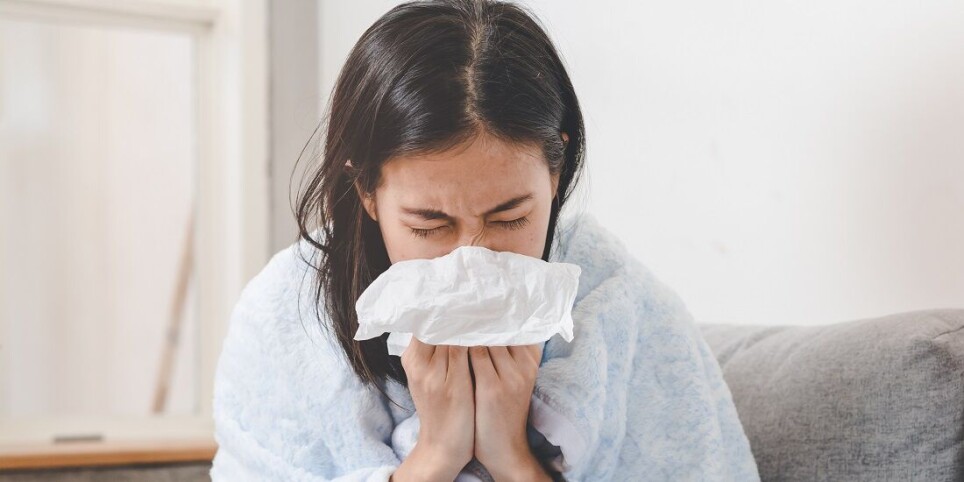THIS ARTICLE/PRESS RELEASE IS PAID FOR AND PRESENTED BY NTNU Norwegian University of Science and Technology - read more

Low herd immunity might cause severe flu winter
Flu season might be much worse than usual because we have lost a lot of herd immunity. Pandemic measures are part of the reason. Hand washing and vaccination are still important.
The flu season is upon us.
Influenza usually kills approximately 1000 people every year in Norway. This is more than the number of people who have died from COVID-19 in the country as of 10 September 2021. Globally, the World Health Organization (WHO) estimates that the flu kills 290,000 to 650,000 people per year.
Last year, almost no one in Norway became infected with the flu, a trend that was reflected in many countries across the globe. The main reasons were all the coronavirus measures , and that people were good at washing their hands and being careful. But this year society might have to pay the price.
Several experts believe that we will probably see a sharp increase in influenza and other viral infections this winter.

Svein Arne Nordbø is one of these experts. He is an associate professor at NTNU’s Department of Clinical and Molecular Medicine and chief physician at the Department of Medical Microbiology, St. Olav’s Hospital.
Why might this flu season be worse?
Nordbø believes all indications are that we can expect a major outbreak of influenza in the coming winter season.
“Last season, we actually didn’t detect a single case of influenza in the Department of Medical Microbiology at St. Olavs Hospital in Trondheim. We’ve never experienced that before. This is probably mostly due to the strict infection control measures in place for the coronavirus pandemic,” he says.
However, this means that herd immunity in the population has fallen and that we are more susceptible to becoming infected with the flu in the coming months, especially if infection control measures are reduced to a minimum.
In part, herd immunity decreases because:
- Several cohorts with young children have been exposed to less infection than previously, meaning they will be more prone to infection.
- It has been longer since the rest of us have been exposed to more infection, and thus we have lost the immunity we had.
- Viruses have had a longer time to mutate in parts of the world where the flu has still been prevalent.
What other viruses are more infectious than what we’re used to?
In the autumn, we always see a flare-up of the common cold (rhinovirus), especially at the start of the school year. This has also been the case this fall.
“We’re also starting to see cases of RS virus (RSV) that can cause serious respiratory infections in young children. These infections primarily occur in winter, but this year the season seems to be starting much earlier,” says Nordbø.
Denmark has already had a major RS virus epidemic when they lifted coronavirus-related measures. Since Norway had very few cases of RSV last winter, the conditions lend themselves to a major outbreak in the country as well.
What might the consequences be?
“We can expect more hospital admissions if we have a larger outbreak of influenza and RSV. We have to intensify testing for these viruses as well as the coronavirus, which is unlikely to release its grip right away,” Nordbø says.
In the worst case scenario, the oldest segment of the population could experience more deaths from the flu.
What can we do to limit infection?
The influenza B virus and RS virus are contagious in the same way as the coronavirus. The same infection control measures can also reduce the spread of these viruses.
“Unlike the Chinese, we don’t have a tradition of wearing face masks during the flu season, but the experiences from the coronavirus pandemic could change this,” says Nordbø.
Alcohol as a hand cleanser works well on respiratory viruses like influenza, coronavirus and RSV. This is because they are enveloped viruses that have a lipid membrane on the outside that has to be intact for the virus to be able to bind to human cells.
“On the other hand, alcohol and other cleansers have little or no effect on more robust viruses that don’t have a lipid membrane, such as adenovirus and enterovirus,” Nordbø said.
Nordbø points out that we also can’t continue with the strict restrictions for a long time.
“Effective and frequent hand washing is still very important. Getting a flu shot this autumn is more important than ever.”
———
Read the Norwegian version of this article at forskning.no
See more content from NTNU:
-
Fish farming is least harmful to the seabed in the north
-
Study: Centralising hospitals has reduced birth mortality
-
Early testing of schoolchildren: “We found absolutely no effect”
-
This determines whether your income level rises or falls
-
Why is nothing being done about the destruction of nature?“We hand over the data, but then it stops there"
-
Researchers now know more about why quick clay is so unstable





































